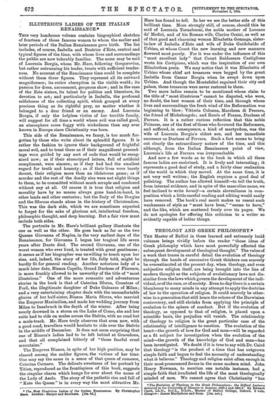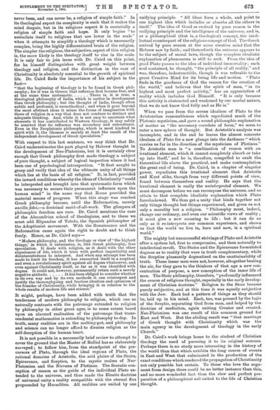THE Master of Balliol in these learned and extremely lucid
volumes brings vividly before the reader "those ideas of Greek philosophy which have most powerfully affected the subsequent development of theological thought." The value of a work that traces in careful detail the evolution of theology through the hands of successive Greek thinkers can scarcely be overestimated at the present day, when theology, and even subjective religion itself, are being brought into the line of modern thought as the subjects of evolutionary laws not dis- similar from the laws which govern the development of the indi- vidual, or of the race, or of society. Even to-day there is a certain blasphemy to many minds in any attempt to apply the doctrine of law to the operation of religion. It could scarcely be other- wise in a generation that still hears the echoes of the Darwinian controversy, and still shrinks from applying the principle of evolution to the sphere of conduct. But if the evolution of theology, as opposed to that of religion, is placed upon a scientific basis, the prejudice will vanish. The relationship of theology to religion is the great particular case of the relationship of intelligence to emotion. The evolution of the heart—the growth of love for God and man—will be regarded as a fit subject for investigation when the evolution of the mind—the growth of the knowledge of God and man—has been investigated. We doubt if it is true to say with Dr. Caird that theology "is the product of a time that has outgrown simple faith and begun to feel the necessity of understanding what it believes." Theology and religion exist often enough in their most pronounced forms in the same modern mind. John Henry Newman, to mention one notable instance, had a simple faith that irradiated the life of the most theologically minded of men. We cannot agree that Christianity "has • The Evolution of Theology in the Greek Philosophers : the Gifford Lectures delivered in the University of Glasgow in Sessions 1900-1 and 1901-2. By Edward Caird, LL.D., D.C.L., D.Litt., Master of Balliol College, Oxford. 2 vols. Glasgow; James MaeLehose and Sons, [14a. net.] religion of simple faith and hope. It only begins "to
assimilate itself to religions that are lower in the scale" when it attempts to simplify a theology which is necessarily
complex, being the highly differentiated brain of the religion. The simpler the religious, the subjective, aspect of this religion is, the more likely is the theology itself to rise in the scale. It is only fair to join issue with Dr. Caird on this point, for he himself distinguishes with great weight between
theology and religion, and the distinction in the case of Christianity is absolutely essential to the growth of spiritual life. Dr. Caird finds the importance of his subject in the
"that the beginning of theology is to be found in Greek phil- osophy; for it was in Greece that reflexion first became free, and
at the same time systematic There is, it is true, a theological philosophy of India, which is earlier in development than Greek philosophy ; but the thought of India, though often subtle and profound, is unmethodical ; and when it goes beyond the most abstract ideas it mixes the forms of imagination with those of religion in a way that does not conduce to distinct and adequate thinking. And, while it is not easy to ascertain what elements it has contributed to Western theology, it may safely be asserted that its influence was secondary and subordinate. Even in the Neoplatonie philosophy, which is most kindred in spirit with it, the likeness is mainly at least the result of the independent development of Greek speculation."
With respect to this last sentence, we may think that Dr. Caird underestimates the part played by Hebrew thought in the development of Neo-Platonism, but it is certainly clear
enough that Greek philosophy first made theology a subject of pure thought, a subject of logical inspection where it had been one of psychological introspection. "It first sought to grasp and verify that idea of the ultimate unity of all things which lies at the basis of all religion." It, in fact, provided the inward conditions whereby the ideas of Christianity "could be interpreted and brought into that systematic form which was necessary to secure their permanent influence upon the human mind" in the same way that Rome provided the material means of progress. When this stage was reached
Greek philosophy became, until the Reformation, merely ancilla fidei,—a doctrinal maid-of-all-work. The glimpses of philosophic freedom are rare. Dr. Caird mentions the case
of the Alexandrian school of theologians, and to these we must add Elipanclus of Toledo, the Spanish philosopher of the Adoptionist movement. With the Renaissance and the
Reformation came again the right to doubt and to think freely. Hence, as Dr. Caird says— "Modern philosophy, and the theology or view of the highest things,' in which it culminates, is, like Greek philosophy, free speculation. It deals with religion, as it deals with the other experiences of life, which it tries with perfect impartiality and disinterestedness to interpret. And when any attempt has been made to limit its freedom, it has reasserted itself in a sceptical and even a revolutionary spirit against all dogma whatsoever, and even against Christianity itself, so far as it was identified with dogma. It could not, however, permanently retain such a merely
negative attitude It has been obliged to consider whether in its own way and by its own methods it can reinterpret and justify the thoroughgoing and fearless idealism and optimism of the founder of Christianity, while bringing it in relation to the whole results of modern life and science."
It might, perhaps, have been added with truth that the tenderness of modern philosophy to religion, which one so naturally contrasts with the patronage extended to religion by philosophy in other great ages, is to some extent based upon an alarmed realisation of the patronage that trans-
cendental mathematics is extending to philosophy to-day. In truth, many realities are in the melting-pot, and philosophy and science can no longer afford to dismiss religion as the self-deception of the human heart.
It is not possible in a necessarily brief review to attempt to cover the ground that the Master of Balliol has so elaborately surveyed ; to follow him, from the standpoint of the pre- cursors of Plato, through the ideal regions of Plato, the rational domains of Aristotle, the arid plains of the Stoics, Epicureans, and Sceptics, to the mystic realms of Neo- Platonism and the Nirvana of Plotinus. The Socratic con- ception of reason as the guide of the individual Plato ex- tended to the universe, and thus made the Eleatic doctrine of universal unity a reality compatible with the eternal flux propounded by Heraclitus. All realities are united by one
unifying principle. "All ideas form a whole, and point to one highest idea which includes or absorbs all the others in itself." The idea of Good as evolved by pure reason is the unifying principle and the intelligence of the universe, and is, as a philosophical (that is, a theological) concept, the intel- lectual counterpart of the religious concept of God. The Greek arrived by pure reason at the same creative mind that the Hebrew saw by faith ; and thenceforth the universe appears to be the subject of moral laws, though the complete idealistic: explanation of phenomena is still to seek. From the idea of good Plato passes to the idea of individual immortality ; each soul contained, he thought, "the principle of all reality," and was, therefore, indestructible, though it was referable to the great Creative Mind for its being life and motion. "Plato finds in the goodness of God the reason for the creation of the world," and believes that the spirit of man, "in its highest and most perfect activity," has an appreciation of reality which includes God Himself. "It is only because this activity is obstructed and weakened by our mortal nature, that we do not know God fully and as He is."
When we pass from the serene idealism of Plato to the Aristotelian reasonableness which repudiated much of the Platonic mysticism, and gave a sound philosophic explanation of matter as "the necessary correlate of form," we seem to enter a new sphere of thought. But Aristotle's analysis was incomplete, and in the end he leaves the almost concrete idealism of Plato for a new plunge into the darkness "which carries us far in the direction of the mysticism of Plotinus." To Aristotle man is "a combination of reason with an irrational element, which it cannot completely absorb or take up into itself," and he is, therefore, compelled to exalt the theoretical life above the practical, and make contemplation the great end of being. Dr. Caird, in a chapter of singular power, repudiates this irrational element that Aristotle and Kant alike, though from very different points of view, found between themselves and reality. He says that the irrational element is really the uninterpreted element. We must decompose before we can recompose the universe, and so attain to that complete idealistic explanation which Plato foreshadowed. We thus get a unity that binds together not only things thought but things experienced, and gives us not only a morality but a religion. "Philosophy must, indeed,. change our ordinary, and even our scientific views of reality ; it must give a new meaning to life : but it can do so only as it re-interprets our common experience, and shows us that the world we live in, here and now, is a spiritual world."
The mighty but unsuccessful strivings of Plato and Aristotle after a system led, first to compromise, and then naturally to intellectual revolt. The Stoics and the Epicureans formulated dogmas as to reality that were in truth complementary, while the Sceptics pleasantly dogmatised on the unattainability of truth. These lesser men were not, however, altogether beating the air, for they gave to the thinkers of that age a new con- centration of purpose, a new conception of the inner life of man. The Stoic philosophy, therefore, "profoundly influenced the course of religious thought, especially in the early develop- ment of Christian doctrine." Religion to the Stoic became purely subjective, and at this time it was equally subjective with the Jew. Each had a pattern of things as they should be, laid up in his mind. Each, too, was pressed by the logic of the Sceptic, separating God from man, and helped by the doctrine of mediation, again uniting Creator and created. Neo-Platonism was one result of this common ground for East and West. But the abiding result was "that marriage of Greek thought with Christianity which was the main agency in the development of theology in the early Church."
Dr. Caird's work brings home to the student of Christian theology the need of pursuing it to its original sources. Perhaps there is no study more interesting in the history of the world than that which exhibits the long course of events in East and West that culminated in the production of the exact conditions which rendered the propagation of Christianity not only possible but certain. To those who love the argu- ment from design there could be no better instance than this, and no more wonderful fact than the slow and perfect pre- paration of a philosophical soil suited to the life of Christian thought.



























































 Previous page
Previous page